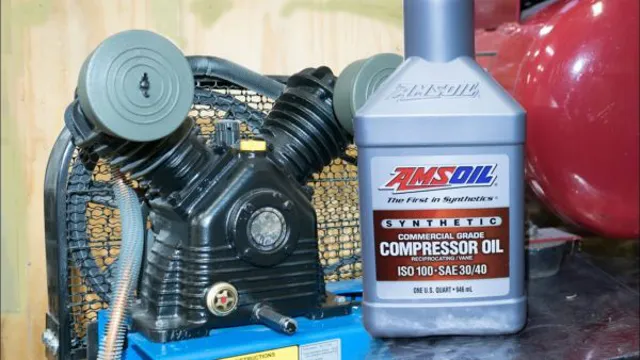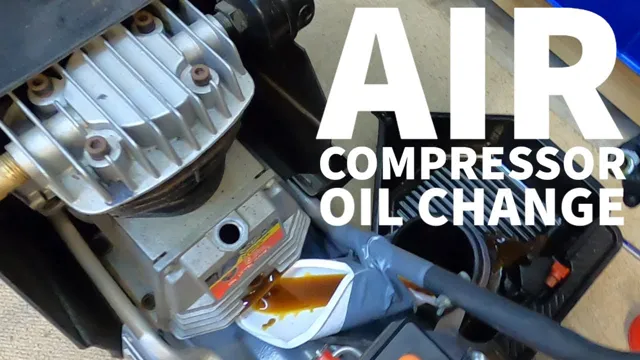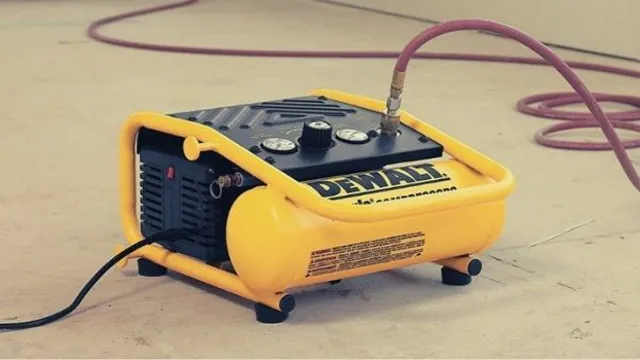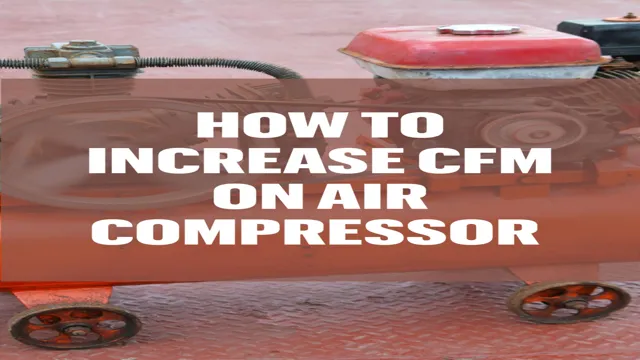Does Air Compressor Need Oil? A Complete Guide to Understanding the Importance of Compressor Oil

If you’ve recently purchased an air compressor, you may be wondering whether or not it requires oil. The answer is yes, most air compressors require oil to properly function. But why is oil so important for air compressors? Well, much like how the engine in your car needs oil to keep all the moving parts lubricated and working efficiently, an air compressor requires oil for the same reason.
Without oil, the compressor’s motor can overheat, and the compressed air can become contaminated with dust and debris. So, if you want your air compressor to last and perform well, make sure to keep it properly oiled. In this blog post, we’ll dive deeper into the details of why air compressors need oil and how to properly maintain your air compressor.
Introduction: Understanding Air Compressors
If you’re new to air compressors, you may be wondering if they require oil. The answer is yes. Many air compressors need oil to function properly and efficiently.
The oil is used to lubricate the moving parts of the compressor, reducing friction and preventing damage caused by wear and tear. It also helps to cool the compressor, reducing the risk of overheating. However, it’s important to note that not all air compressors need oil.
Some modern compressors operate without oil, using alternative methods of lubrication such as bearings or polymer coatings. Ultimately, it’s important to check the manufacturer’s instructions to determine whether your air compressor requires oil or not. Failure to maintain the proper oil level can result in damage to the compressor and decreased performance.
So, if you own an air compressor that requires oil, make sure to keep it topped up and change it regularly to avoid any problems down the line.
Explanation: How An Air Compressor Works
Air compressor Air compressors are fascinating machines that serve a variety of purposes in different industries. Simply put, an air compressor converts power (usually from an electric or gas motor) into potential energy stored in compressed air. The machine takes atmospheric air and compresses it, forcing it into a storage tank where the kinetic energy is stored.
Once the tank reaches its capacity, the pressure switch turns off the compressor, stopping further compression. When a pneumatic tool or equipment is connected to the tank, the compressed air is released, powering the device. It’s crucial to note that not all compressed air is suitable for all applications.
It’s critical to consider factors such as pressure, flow rate, and air quality when selecting an air compressor best suited for your needs. A well-lubricated air compressor is also essential in ensuring its longevity and sustained operational efficiency.

Benefits: Why Use An Air Compressor
An air compressor is a versatile tool that is used in various industries, including automotive, construction, and manufacturing. As the name implies, it compresses air to produce power, providing many benefits. One of the benefits of using an air compressor is its versatility.
It can be used for anything from inflating tires to powering pneumatic tools, making it an essential tool in any workshop. Another advantage is its efficiency. Air compressors provide consistent air pressure, making it easier and faster to complete tasks.
They also save time by reducing the need for manual labor. In addition to these benefits, air compressors are also economical, as they reduce the need for other power tools and machinery. With their low maintenance requirements and longevity, they offer a cost-effective solution for many applications.
Overall, using an air compressor can improve productivity, save time, and provide a cost-effective solution for businesses and individuals alike.
Air Compressor Oiling System
Yes, an air compressor needs oil to run smoothly and reliably. Air compressor oil is specifically designed to lubricate the internal components of the machine, reducing friction and minimizing wear and tear. Without proper lubrication, the components can overheat, causing the compressor to malfunction or even break down entirely.
However, not all air compressors are the same, and some may require more or less oil depending on their design and operating conditions. Additionally, the type of oil used can also affect the lifespan and performance of the unit. Using a high-quality air compressor oil and maintaining it regularly is essential to ensure the smooth and efficient operation of your compressor for years to come.
So, if you own an air compressor, make sure you check the oil regularly and top it up as necessary to avoid any costly repairs or replacements.
Overview: The Purpose Of Oil In An Air Compressor
When it comes to an air compressor, oil plays a critical role in keeping it functioning properly. That’s where the air compressor oiling system comes into play. The oil lubricates the compressor’s moving parts so they don’t wear out as quickly and maintains the proper temperature inside the compressor.
Without oil, the compressor could suffer significant damage and even stop working altogether. It’s not just about any oil though, the right type of oil must be used for the specific compressor in order to ensure efficient operation and longevity. Just like a car needs oil changes, an air compressor requires regular oil changes to maintain performance.
So, next time you’re using an air compressor, remember the crucial role that oil plays in keeping it running smoothly.
Types Of Air Compressors And Their Oiling Requirements
When it comes to air compressors, the oiling system is absolutely critical for the proper functioning of the machine. There are different types of air compressors, and each one has its specific oiling requirements. Reciprocating air compressors, for example, need lubricants to reduce heat and wear.
These types of compressors use splash lubrication or forced lubrication from an oil pump. On the other hand, rotary screw compressors require a more sophisticated oiling system. The oil in these compressors serves multiple purposes, including sealing, cooling, and lubricating.
To maintain the integrity of their oiling system, rotary screw compressors require regular oil changes and oil analysis. Failure to maintain the oiling system can result in serious damage to the compressor or even a complete system failure. Therefore, it is important to adhere to the manufacturer’s guidelines when it comes to the oiling requirements of your particular air compressor.
In summary, the health of the oiling system is vital to the operation of the air compressor, and regular maintenance is crucial to prevent costly damages.
Factors That Influence The Oiling Needs Of An Air Compressor
An essential component of an air compressor’s maintenance is its oiling system. Several factors determine the amount of oiling an air compressor needs, including its size, usage, and type of lubricant. Smaller compressors that operate intermittently typically require less oiling than larger models that run continuously.
For compressed air systems that operate in high-temperature environments, synthetic oils may be the best option as they are less likely to break down or evaporate in extreme temperatures. Additionally, the type of air compressor matters as some models require specialized lubricants to function correctly. Understanding the oiling needs of an air compressor is crucial since inadequate oiling can lead to damage and premature wear and tear.
Regularly checking oil levels and changing oil when needed helps maintain the longevity and efficiency of an air compressor.
Maintaining Oil In An Air Compressor
If you’re using an air compressor, you may be wondering whether or not it requires oil. The answer is, yes, air compressors do need oil! In fact, it is essential to keeping your compressor running smoothly and efficiently. The oil is used to lubricate the moving parts inside the compressor, which prevents them from grinding against each other and causing damage.
Additionally, oil helps to remove heat from the compressor, which helps to prevent it from overheating and potentially causing a fire. To maintain the oil in an air compressor, you should check the levels regularly and add more oil as needed. It’s also important to change the oil periodically, as it can become contaminated over time with dirt and debris.
How often you should change the oil depends on how frequently you use your compressor and the type of oil you’re using. Be sure to refer to your user manual for specific instructions. Overall, the importance of maintaining your air compressor’s oil cannot be overstated.
Neglecting to do so can result in costly repairs and downtime. So, if you’re using an air compressor, be sure to keep an eye on the oil levels and change the oil as needed. Your compressor will thank you for it!
The Importance Of Regular Oil Changes
Regular oil changes are essential for the maintenance of air compressors. Without proper oil maintenance, the compressor’s parts begin to wear out, which can lead to costly repairs. Over time, the oil can become contaminated with dirt, debris, and moisture, which can affect the compressor’s performance.
That’s why it’s crucial to change the oil in your air compressor regularly. It’s recommended to change it every 500 hours of operation or every three months, whichever comes first. But, keep in mind that this is only a guideline, and it’s best to follow the manufacturer’s recommendations.
When selecting an oil for your air compressor, make sure to choose a high-quality synthetic or mineral-based oil. Using the right oil can ensure smoother operations, reduce wear and tear, increase efficiency, and enhance the lifespan of your compressor. Regular oil changes can save you money in the long run and keep your air compressor running at its peak performance.
So, make sure to keep a regular oil change schedule and follow it religiously.
How To Check And Add Oil To An Air Compressor
Maintaining oil in an air compressor is crucial for optimal performance. Checking and adding oil is a simple task that can be easily accomplished with a few steps. First, ensure that your air compressor is not running and is unplugged.
Locate the oil level sight glass or dipstick and wipe it clean to remove any debris. Then, check the oil level. If the oil level is below the recommended level, add the appropriate amount of oil according to the manufacturer’s instructions.
It is important to use the proper oil type recommended by the manufacturer to avoid any damage to your compressor. Remember to check the oil level regularly and change the oil as recommended by the manufacturer to keep your air compressor running at peak performance. Taking proper care of your air compressor will prolong its lifespan and ensure it operates efficiently.
Conclusion: To Oil Or Not To Oil?
In short, the answer is yes, an air compressor needs oil. It’s like a car without gas or water without fish – it simply won’t function properly without it. So, remember to keep your compressor well-oiled and you’ll be blowing your competition away in no time!”
FAQs
What type of oil should be used in an air compressor?
It is recommended to use synthetic or non-detergent oil in an air compressor.
How often should I change the oil in my air compressor?
It is suggested to change the oil after every 500-1,000 hours of use or every three months, whichever comes first.
Can I use motor oil in my air compressor instead of compressor oil?
No, motor oil should not be used in an air compressor as it does not have the same properties as compressor oil and may cause damage.
What happens if I don’t use oil in my air compressor?
Running an air compressor without oil can cause damage to the pump and decrease its lifespan.
How do I check the oil level in my air compressor?
Most air compressors have a sight glass or dipstick to check the oil level, but consult your owner’s manual for specific instructions.
Is it necessary to use oil in a lubricated air compressor?
Yes, using oil in a lubricated air compressor helps to reduce wear and tear on the pump parts and increase its lifespan.
How do I dispose of used oil from my air compressor?
Used oil from an air compressor should be disposed of properly according to local regulations. Contact a waste management facility for guidance.







